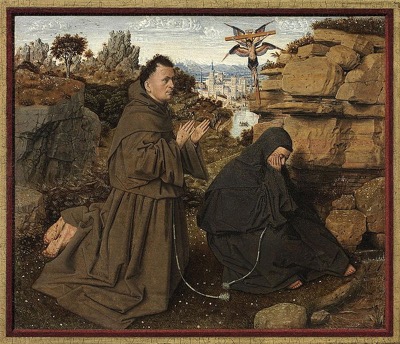Marked

Saint Francis of Assisi Receiving the Stigmata, attributed to Jan van Eyck, c. 1430-32
"My turn will eventually come …"
At five, I was slated for a tonsillectomy. My older brother and sister were to undergo the same procedure at the same time, but when we arrived at the hospital, I was somehow deemed too anemic or something and sent home all by myself in a cab. I still remember that deep sense of relief I felt as the cab pulled away from the hospital with me thinking that I'd actually gotten away with something Scot-free. The next day, my brother and sister were granted unlimited ice cream rations in which I could not share. In a week or so, I had to go the hospital alone to get my tonsils pulled. I remember nothing about the entire adventure except for that great relief I felt when I dodged that bullet, and even though that bullet came around and got me on its second pass, getting away with something made the whole experience well worth the trip. ©2020 by David A. Schmaltz - all rights reserved
I suppose that everyone appreciates feeling special, perhaps because deep down inside most of us don't feel all that special. I once thought that I might make it all the way through this life without getting Marked by the experience, but I ended up shedding my share of blood and earning a few scars, each of which might only add to a specialness I don't really feel. I carry a thin white scar on my lower lip where I once bit through it while clowning around, a tiny surgical scar on my leg from a long-ago lipoma excision, and some scarring I cannot see on my lower back from another surgery. I have deeper psychological scarring, I suppose, but those scars don't show unless someone really gets to know me. I, myself, hardly notice them at all, most days.
So far, thank heavens, the Pandemic has left only the latter sort of scarring on me. I see old standbys falling and I feel enormous sadness at their passing, like life had taken to whittling away at its own foundations. I remember watching my grandfather in wonder, knowing that he'd survived the whole twentieth century. He was wrinkled and wheezy, with mahogany finger tips where he'd held his endless cigarettes. He was on a troop ship set to depart from New York Harbor when the Armistice was signed. He dodged a lot of bullets that time, though he came home to a life of endless hardship, what with the flu pandemic, farm crash, and the Great Depression, with WWII piled on top. He lost his wife, my grandmother, in middle age, and seemed to wander the world wounded for the rest of his life. Life can do that to anyone, without apparent reason.
Pandemics leave whole societies permanently Marked. At the point of contact, few worry about the eventual scarring. We're first concerned with somehow stopping the bleeding, understanding that healing time, if it comes, could only come later, and scars setting even after that. First, somehow stop the scythe, knowing that many lives will be sacrificed in merely stopping it. Marked is exclusively a survivor's side effect of the experience. If only the fortunate survive, only the fortunate are Marked. Nobody gets away with anything this time, even if I slip away scot-free and nobody near or dear succumbs. My turn will eventually come even if I catch a cab back home by myself today.


